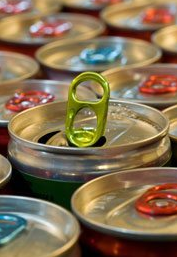Artificial Sweeteners
The health benefits of artificial sweeteners are inconclusive, with research showing mixed findings. Diet soda may not be a healthy substitute for sugary soda.
For adults trying to wean themselves from sugary soda, diet soda is a possible short-term substitute, best used in small amounts over a short period of time.
For children, the long-term effects of consuming artificially-sweetened beverages are unknown, so it’s best for kids to avoid them.
There is conflicting research surrounding the health benefits of artificially sweetened drinks. Long-term studies show that regular consumption of artificially sweetened beverages reduces the intake of calories and promotes weight loss or maintenance, but other research shows no effect, and some studies even show weight gain. (55)
A 2013 study showed that both sugar-sweetened beverages and artificially sweetened beverages were linked with an increased risk of developing Type 2 Diabetes, however, more research is needed to prove a causal link. (58)
One study of 3,682 individuals examined the long-term relationship between consuming artificially sweetened drinks and weight. The participants were followed for 7-8 years and their weights were monitored. After adjusting for common factors that contribute to weight gain such as dieting, exercising change, or diabetes status, the study showed that those who drank artificially sweetened drinks had a 47% higher increase in BMI than those who did not.
One concern about artificial sweeteners is that they affect the body’s ability to gauge how many calories are being consumed. Some studies show that sugar and artificial sweeteners affect the brain in different ways.
The human brain responds to sweetness with signals to eat more. By providing a sweet taste without any calories, however, artificial sweeteners cause us to crave more sweet foods and drinks, which can add up to excess calories.
At the University of California-San Diego, researchers performed functional MRI scans as volunteers took small sips of water sweetened with sugar or sucralose. Sugar activated regions of the brain involved in food reward, while sucralose didn’t. (56) It is possible, the authors say, that sucralose “may not fully satisfy a desire for natural caloric sweet ingestion.” So, while sugar signals a positive feeling of reward, artificial sweeteners may not be an effective way to manage a craving for sweets.
A 2011 statement from the American Heart Association and American Diabetes Association concluded that when used judiciously, non-nutritive sweeteners (including very low-calorie sweeteners, artificial sweeteners, and non-caloric sweeteners) might help with weight loss or control, and could also have beneficial metabolic effects. The statement also points out, however, that these potential benefits will not be fully realized if there is a compensatory increase in energy intake from other sources – ultimately saying that at this time there are insufficient data to make a conclusive determination about using non-nutritive sweeteners; more research is needed. (57)
To date, the FDA has approved the use of six artificial sweeteners; each one is far sweeter than regular sugar. (55) They include:
Stevia
One natural low-calorie sweetener, stevia, has not yet been evaluated by the FDA.
Stevia is a non-caloric sweetener made from the leaves of a shrub that grows in South and Central America.
Stevia is about 300 times sweeter than sugar.
A number of major soft drink companies have begun launching stevia-sweetened beverages, sometimes combining stevia with erythritol, a sugar alcohol.
There are no long-term studies of the health effects of stevia.
Sugar alcohols
Erythritol and xylitol are sugar alcohols, a class of compounds that have been used for decades to sweeten chewing gum, candy, fruit spreads, toothpaste, cough syrup, and other products. Newer, cheaper ways to make sugar alcohols from corn, wood, and other plant materials, along with their sugar-like taste, are fueling their use in a growing array of foods.
References
55. Bellisle F, Drewnowski A. Intense sweeteners, energy intake and the control of body weight. Eur J Clin Nutr. 2007;61:691-700.
56. Frank GK, Oberndorfer TA, Simmons AN, et al. Sucrose activates human taste pathways differently from artificial sweetener. Neuroimage. 2008;39:1559-69.
57. Gardner C, Wylie-Rosett J, Gidding SS, et al. Nonnutritive sweeteners: current use and health perspectives: a scientific statement from the American Heart Association and the American Diabetes Association. Diabetes Care. 2012;35:1798-808.
58. Fagherazzi G, Vilier A, Saes Sartorelli D, Lajous M, Balkau B, Clavel-Chapelon F. Consumption of artificially and sugar-sweetened beverages and incident type 2 diabetes in the Etude Epidemiologique aupres des femmes de la Mutuelle Generale de l’Education Nationale-European Prospective Investigation into Cancer and Nutrition cohort. Am J Clin Nutr. 2013;97(3):517-23.


EmoticonEmoticon